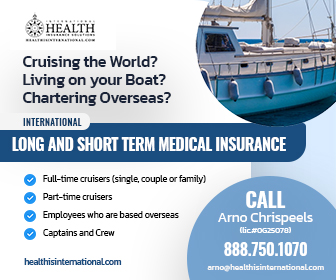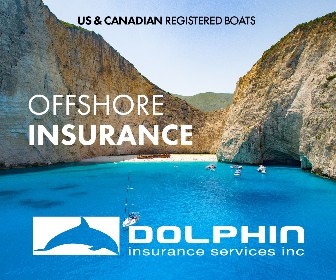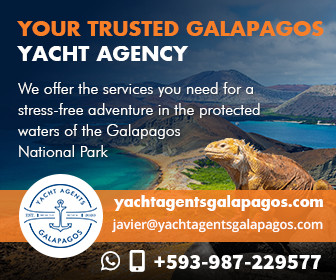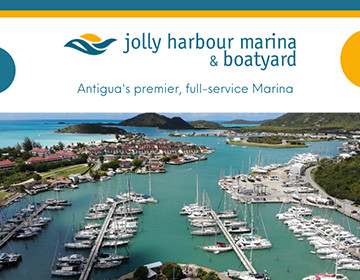Medical Insurance for Caribbean Cruisers
This article by David Lyman was published in Caribbean Compass Magazine in January 2021. Experienced cruiser David shares what he learnt about medical insurance options when cruising in the Caribbean.
Published 4 years ago




“Kids! Help!” I shouted from the bow. “I can’t move.”
Something in my lower back had snapped. I lay flat on my back on the deck next to the windlass, a sharp knife stabbing into my spine. “Roll me over,” I managed to say. “Gently.” My two kids, ages nine and 11, rolled me over so I could rise up into a crouch.
“What happened?” asked Renaissance, my daughter.
“I was hauling in the anchor rode. I pulled too hard. Now, help me back to the cockpit.” They were helpful, if too much so, but I managed to get into a sitting position on the cockpit seat. My back gives me these spasms from time to time. An old skiing accident. When they come, I’m in eye-watering pain. I’d rather have a root canal. I need an adjustment by a chiropractor. It’s a simple maneuver. He jumps on me, twisting my hips one way and shoulders in the opposite directions. I hear and feel something in my lower back ‘snap’ and the pain is gone. I’m sore for a few days as the muscles along my spine recover and mend.
I needed a chiropractor now.


We’d been anchored in Prickly Bay on the island of Grenada for a few weeks. A Google search found a chiropractor in nearby Le Phare Bleu. Julie, my wife, called and made an appointment for the next day.
The kids got the anchor up and secure, and we motored over, anchoring in Petit Calivigny. The family helped me into the RIB for the short dinghy ride to the marina. The doctor’s clinic was a short walk up the street. He had me sorted me out and back in shape in 20 minutes. EC$60 (approximately US$22).
A few months later the back went out again while anchoring in the shadow of the Pitons on St. Lucia. We found a chiropractor’s clinic in Rodney Bay. Again, for EC$60 I was fixed up.
Time to do some research
The older I get, the more I’m at risk of hospitalization, or at least a visit to a local island clinic. What are my options? When in trouble, I tell those who sail with me, seek local knowledge.
I asked the editor of Caribbean Compass Magazine what she and her husband do for medical care, living as they do full time on Bequia. “The Bequia Hospital has been great for routine mishaps and follow-ups, and the dentist and dermatologist we see on St. Vincent, for example, are excellent and much more reasonably priced than those in the States,” she said. “But we are both covered by Medicare, so we fly to the States for anything really serious.” She added, “Why don’t you write an article on medical insurance for cruisers to follow up on the yacht insurance stories in the November issue?”
There are clinics on most Eastern Caribbean islands and hospitals on the larger ones. Naturally, some are better than others, so it’s wise to ask local folks for recommendations. While treatment is generally at much less cost than back home, it will be an out of pocket expense. So, what about medical insurance — especially for a serious injury or illness?
Medical insurance for cruisers and Caribbean residents
If you are a US citizen, retired and over 65, you probably have Medicare, Part A and B. Medicare does include treatment in the USVI and Puerto Rico, but with limited facilities there. And, even at home, Medicare does not cover all medical costs. You’re stuck paying 20 percent for an outpatient visit, and a hefty co-pay for hospitalization. If you travel outside the US, there are few situations where Medicare might reimburse your out of pocket costs. There are supplemental policies (such as MediGap) you can buy that will fill in what Medicare will not, and some plans include travel outside the States, but for only a limited time.
If you are under 65 you may already have private medical insurance, but will it cover medical expenses when cruising in the Caribbean? A hospitalization plan such as Blue Cross/Blue Shield might cost you in excess of $10,000 a year (prices in this article are given in US dollars unless otherwise specified). That’s the price of a new set of sails, an engine replacement, or the entire cost of a winter in the Caribbean. Got any options? Sure, haul the boat and stay at home. Okay, I agree: lousy idea. What else? Research.
I’ll share what I’ve learned. This is not the complete story; it’s just my story. You’ll need to do your own research, read the fine print on various policies, chat with agents, confer with family and make your own choices. It’s not easy, and it’s not inexpensive.
A few of those I chat with at beachside bars admit they self-insure their boats and their bodies. It’s a gamble. But, they tell me, after raising sails for 30 years, self- insurance has worked so far. The only times I’ve had to seek medical services in the Caribbean were those two chiropractors.
What if you stuck away $200 a month in a savings account, just for medical emergencies? Create your own insurance plan. In a year, you’d have $2,400. That’s a plane ticket home for treatment, or an outpatient visit to an island clinic.
Now, add in another wrinkle. I hear that some islands, such as Anguilla, the Cayman Islands and the Turks & Caicos, are now requiring proof of health insurance coverage on clearing in, to include Covid-related treatment.


If you’re a US citizen on Medicare, you might consider buying a MediGap policy, a supplemental policy to cover what Medicare does not.
I’m a member of AARP (American Association of Retired Persons). I requested their “Supplement” brochure and received a 30-page booklet listing a dozen plans. Plans D and N looked good, as they covered travel abroad, but I had questions. I called AARP and spoke with a rep. We went through the application process, using me as the subject. At the end, if I was in perfect health, which I am, with no “prior existing conditions” the supplemental “N” policy, which covers travel, would cost me $172.25 a month. It would cover me for what Medicare would not — but only for the first 60 days of being outside the US or its territories. There’s got to be a better way.
For those spending an entire year or season on their boats or in an island residence, Medicare, even with the supplemental plan, appears inadequate. What do you do you do after the 60 days — fly home every time you need medical attention? Many I’ve talked with do just that. Or you pay out of pocket to an island clinic.
Variables and Possibilities
What might it cost to fly back to your home country for medical attention? Less than $1,000 on a regular scheduled airline. What if the medical situation required an immediate evacuation flight to your hospital at home? I called two medevac companies based in Florida. A flight from Antigua to Boston would take three to four hours, and would cost between $28,000 and $48,000. Ouch! There’s got to be a cheaper alternative.


Was the $227 quote from Trawick International Insurance, a one-time payment, or monthly? She wrote, “It will cover the four months you requested on the application. It will cover evacuation and medical service and it will cover Covid.
“Travel insurance policies are dependent on three main factors,” she added, “trip length, traveler’s age and, if including trip cancellation coverage, the cost of the trip. Some policies are rated better for travelers of a certain age, or for travelers who are taking trips of a certain length.” Many of the policies I explored wouldn’t cover those over 84, 75, even 65.
When it came to the “evacuation” part, she wrote, “The policy language for a medical evacuation will vary by travel insurance provider, but in most cases, an emergency evacuation must be ordered by a licensed physician, who certifies that the traveler requires an emergency evacuation due to the severity of their injury or illness.”


I spoke with Rick Bagnall, an agent in their marine division. I couldn’t pin Rick down to a specific policy and cost. “There are too many variables and possibilities,” he said, adding he needs to talk a client through the options to find the best fit.
“I can put you in a comprehensive medical plan that’s global for less than most current US carriers,” he said. I wasn’t successful in digging more out of Rick; I’ll leave that up to you should you call him. But I was impressed with the Gowrie Groups’ website (Gowrie.com), and their involvement in the marine community.


“These are all out-patient services and would be covered.”
I asked about Covid-related treatment. “Yes, it would be covered the same as any sickness.” How about a Covid test? “If you are experiencing symptoms, yes, the test is covered. If you just wanted see if you had Covid, that’s discretionary, and would not be covered.”
“Evacuation?” she asked. Yes, I wanted to consider getting flown home. “That would also cover ‘repatriation.’”
“There’s a difference?” I asked.
“Yes. Evacuation is to get you to the nearest medical facility; repatriation is to get you all the way home.”
“Do you want dental coverage?” She asked. No, I said, there are dental clinics on most of the islands, and most cost a lot less than those in the States.
“It looks like the plan you’ve requested will cost $1,870 a month,” she said when the quote arrived on her screen. “How much if we take away the evacuation/ repatriation coverage,” I asked. “That would bring your plan down to $1,734.” Ouch! That only saves a C-note. “If we remove coverage while in the US,” she added, “that brings your plan down to $1,402.” I wouldn’t need Cigna’s coverage once back in the States, as I’m covered by the Veteran’s Administration and Medicare.
“The outpatient part of your plan is $600 all by itself,” she added. Is that a month, I asked? “Yes, a month.”
Now I have to think, what’s my best guess as to what I might need while I’m floating around in the Caribbean? The only medical attention I’ve needed in 20 years of Caribbean cruising was the service of a chiropractor, and that was an out-of-pocket expense I gladly bore. While a visit to an emergency ward in the States could cost me $3,500, outpatient care in an island clinic would be a lot less. But were I to have a stroke, a heart attack, a serious liver infection, I’d need hospitalization. If it were elective surgery, I’d fly back to the States. Ashley sent me an e-mail with the final quote. The price came down to $908.37 a month. That’s $10,000 a year. The policy would not cover outpatient care, but would cover: cost share with a $0 out of pocket maximum.
Cigna provides a card, much like a Medicare card, that you show to the care provider and they bill Cigna directly. Theirs is not a reimbursement plan. Cigna pays the provider directly, and the coverage is worldwide, except, in my case, with no coverage in the States.
What about repatriation or evacuation?
Now how about getting me stateside and to the VA or Medicare facility? I can usually fly home for less than $1,000. But if I’m unconscious, strapped to a bed, and in need of immediate attention I might need a medevac flight.
There are a number of membership plans that might cover an evacuation or repatriation flight back to the hospital at home.






So, I’m thinking… A phone call to a medical pro at DAN or Global might replace or augment a visit to a local clinic. If I am to treat myself, I’ll need a well-equipped first aid kit and some training. My captain’s license requires I have completed a CPR course. Companies like Medaire can provide training and there are companies that will help you put together a first aid medical kit, based on crew size, age, medical history and destination.
I asked Chris, a sailing friend and registered nurse, how she handles medical emergencies. She and her husband live half of each year on a small Caribbean island. “I have medical kits here that include most of our needs for lacerations, cuts, sprains and burns, along with basic medications including antibiotics, steroid creams, and some over-the-counter pain meds. I want to be prepared to treat us for minor issues. If it were something serious, we’d fly to Barbados, Florida, or home to Maine.”
There are clinics throughout the islands, but their capabilities vary widely and their budgets are sometimes stretched. For $514 a year, I’d call Global and talk with a medical pro before going ashore to a clinic that has been well recommended for the particular care I needed.
Final Thoughts
My boat was insured for $150,000 total loss, with a $2,000 deductible on lesser losses or damage. The annual premium? $3,500. That’s close to $300 a month.
What am I worth? Certainly more than the value of my boat.
Am I willing to gamble that fate will not saddle me with a serious ailment or injury, something I can’t fix myself? What would make me feel better about the future, a $60 membership with DANBoater.org? A $514 membership with Global Rescue? Each of those gives me access to advice and, if necessary, evacuation. A $227 insurance plan with SquareMouth (Trawick) might cover the local emergency ward and attending doctor expense. And, if needed, a flight to Florida, Puerto Rico, or home with the cost covered. Medigap is not helpful after the second month of being away. The $900 a month policy with Cigna would be helpful in my situation, as I have the VA (I’m a Vietnam veteran) and Medicare covering me at home. For those of you with no medical insurance who are cruising full time, it’s either self-insurance or something like the Cigna plan.
But as Rick from the Gowrie Group said, “There are too many variables and possibilities.” I hope this article has enticed you to do your own research.


David is a journalist, author, photographer and producer. His articles on adventure and sailing have appeared in Caribbean Compass, All at Sea, PointsEast, and Cruising World, his mountaineer and skiing stories appeared in Ski, Skiing, Ski America, and The Student Skier magazines.
…………………………………………………………………………………………………………………………………….
Related Links:
Boat Insurance by David H. Lyman for Caribbean Compass (Nov. 2020)
What you Need to Know about Travel Insurance (New York Times -Nov. 2020)
Noonsite’s Insurance Page with Reports and Links
…………………………………………………………………………………………………………………………………….
The opinions expressed in this article are the author’s own and do not reflect the view of Noonsite.com or World Cruising Club.
Related to following destinations: Anguilla, Antigua & Barbuda, Aruba, Bahamas, Barbados, Belize, Bermuda, Bonaire, British Virgin Islands, Cuba, Curacao, Dominica, Dominican Republic, Grenada, Guadeloupe, Haiti, Jamaica, Martinique, Montserrat, Puerto Rico, Saba, Sint Maarten, St. Barts, St. Kitts & Nevis, St. Lucia, St. Martin, St. Vincent & the Grenadines, Statia, Trinidad & Tobago, Turks & Caicos, US Virgin Islands
Related to the following Cruising Resources: Caribbean Sea, Cruising Information, Insurance, Planning and Preparation, Routing, Travel Health Insurance








Great read, thank you for taking the time to write it. My wife and I are from Canada and purchasing our first cruiser to take us and our two young boys on. I’m curious if the medical insurance pricing you’ve shown in the article covered just you or were those prices for your whole family?